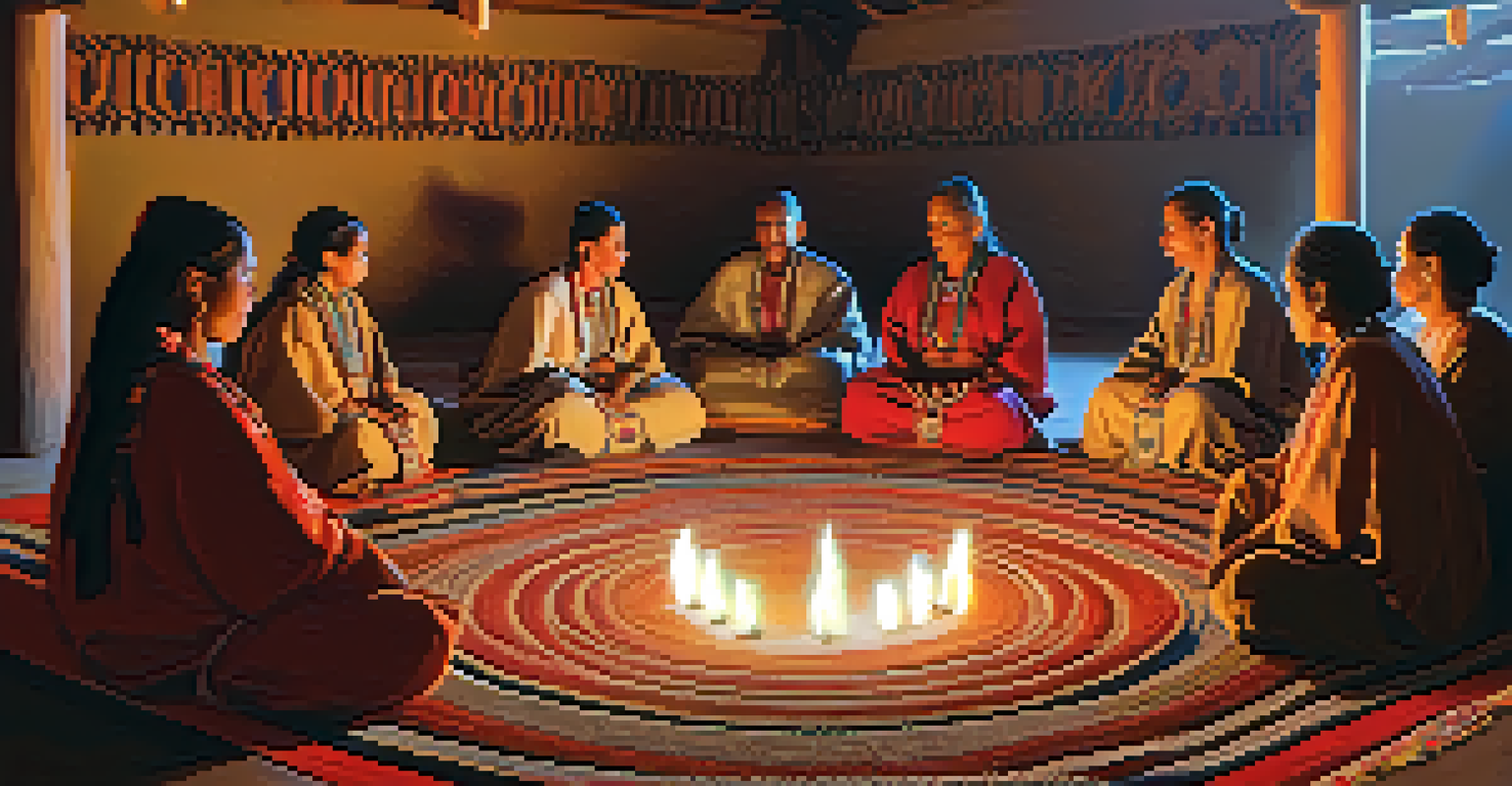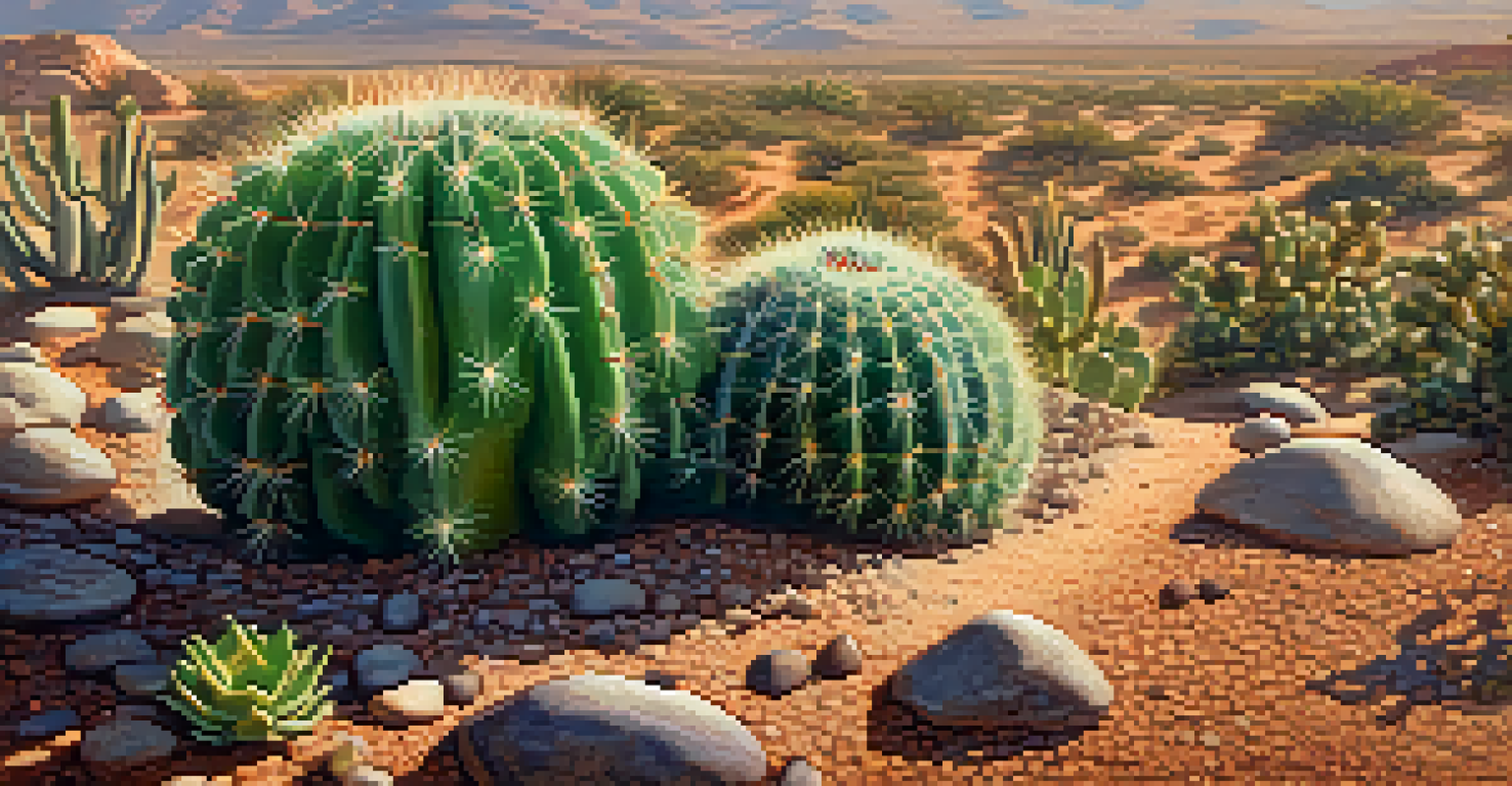Shared Histories: Peyote and Its Ancestral Ties

Understanding Peyote: A Brief Overview
Peyote, a small cactus native to Mexico and the southwestern United States, has been used for thousands of years in various cultures. Known scientifically as Lophophora williamsii, it contains psychoactive alkaloids, particularly mescaline, that induce vivid hallucinations. These properties have made Peyote a crucial element in spiritual rituals and healing practices among Indigenous peoples.
The use of Peyote in ceremonies reflects a deep reverence for nature and the belief in its healing powers.
For many tribes, Peyote is more than just a plant; it represents a sacred connection to the spiritual world. The use of Peyote in ceremonies reflects a deep reverence for nature and the belief in its healing powers, promoting well-being and spiritual insight. This intricate relationship with Peyote highlights the broader connection between culture and the natural environment.
In modern times, Peyote has garnered interest beyond Indigenous communities, sparking conversations about cultural appropriation and the importance of preserving its traditional use. Understanding the historical context of Peyote is essential in appreciating its significance to those who have relied on it for generations.
The Ancestral Ties of Peyote Use
Peyote use is deeply rooted in the histories of various Indigenous tribes, particularly the Huichol, Navajo, and Lakota. These cultures have long recognized the cactus as a means of connecting with ancestors and the divine. The rituals surrounding Peyote ceremonies often involve storytelling, music, and communal bonding, reinforcing these ancestral ties.

Through the lens of history, it's evident that Peyote has played a pivotal role in shaping cultural identities. For instance, the Huichol people undertake long pilgrimages to gather Peyote, which symbolizes their enduring connection to their land and heritage. This practice not only honors their ancestors but also serves as a reminder of their responsibilities toward future generations.
Peyote's Role in Indigenous Culture
Peyote serves as a sacred plant in Indigenous ceremonies, fostering spiritual connection and community bonding.
As these traditions continue to be passed down, they adapt to contemporary challenges while maintaining their core values. The resilience of these practices speaks to the strength of ancestral connections that transcend time, demonstrating the importance of preserving cultural heritage in a rapidly changing world.
Spiritual Significance of Peyote Ceremonies
Peyote ceremonies serve as a conduit for spiritual exploration and healing. Participants often report profound experiences that can lead to personal revelations and a strengthened sense of community. These gatherings provide a space for individuals to confront their inner struggles and seek guidance from the spirit world.
Peyote serves as a conduit for spiritual exploration and healing.
The ceremonies typically involve a structured format, including prayers, songs, and the sharing of experiences. Elders play a crucial role in guiding the rituals, ensuring that the teachings of the past are honored and respected. This intergenerational transmission of knowledge fosters a sense of continuity and stability within the community.
Moreover, the spiritual significance of Peyote extends beyond individual experiences; it reinforces collective identity. The shared journey through these ceremonies cultivates unity and solidarity, reminding participants that they are part of something greater than themselves.
Cultural Appropriation and Modern Context
As Peyote has gained popularity outside Indigenous communities, it has raised questions about cultural appropriation. Many individuals and groups seek to partake in Peyote ceremonies without understanding the cultural significance and historical context behind these practices. This can lead to a commodification of sacred traditions, undermining their spiritual value.
Indigenous leaders have voiced concerns about the unauthorized use of Peyote, emphasizing the need for respect and understanding. They advocate for education around the cultural significance of Peyote, encouraging non-Indigenous people to approach the subject with sensitivity. This dialogue is essential in fostering mutual respect and preventing the erasure of Indigenous identities.
Cultural Appropriation Concerns
The growing interest in Peyote outside Indigenous communities raises important discussions about cultural appropriation and the need for respect.
As discussions around cultural appropriation continue, it becomes increasingly important to honor the traditions of Indigenous peoples. Supporting Indigenous-led initiatives and promoting awareness can help bridge the gap between cultures, allowing for a respectful exchange of knowledge and experience.
Legal Status and Protection of Peyote
The legal status of Peyote varies significantly across regions. In the United States, it is classified as a controlled substance, which complicates its use in traditional ceremonies. However, certain tribes are granted exemptions under the American Indian Religious Freedom Act, allowing them to use Peyote in their spiritual practices.
The ongoing legal battles surrounding Peyote highlight the tension between cultural rights and governmental regulations. Many Indigenous advocates argue for the protection of Peyote as a sacred plant, emphasizing its importance to their cultural and spiritual identities. This struggle is emblematic of the broader fight for Indigenous rights and recognition.
As discussions around legalization and protection continue, it's crucial to involve Indigenous voices in the conversation. By prioritizing their perspectives, society can work towards a more equitable framework that respects the traditional use of Peyote while acknowledging its cultural significance.
Peyote's Role in Modern Healing Practices
In recent years, there has been a resurgence of interest in the therapeutic potential of Peyote and other entheogens. Many people are exploring these substances for their potential to address mental health issues, such as PTSD, anxiety, and depression. This interest parallels a growing recognition of the holistic approaches traditionally used by Indigenous cultures.
Modern research is beginning to validate some of the claims made by Indigenous healers about the benefits of Peyote. Studies have shown that the psychoactive properties of mescaline can lead to transformative experiences, offering new perspectives on life and healing. This validation is essential in bridging the gap between traditional and contemporary healing practices.
Legal Status and Indigenous Rights
Peyote's legal status varies, highlighting the ongoing struggle for Indigenous rights and the need for protections in traditional practices.
However, it's vital to approach this newfound interest with respect for Indigenous traditions. Adopting these practices without understanding their cultural context can perpetuate harmful stereotypes and undermine their significance. A collaborative approach that honors Indigenous knowledge while exploring modern applications can lead to more meaningful and respectful healing practices.
The Future of Peyote and Ancestral Traditions
The future of Peyote and its cultural significance hangs in a delicate balance between preservation and adaptation. As modern society continues to grapple with issues of mental health and spirituality, the lessons from Indigenous practices are more relevant than ever. The challenge lies in ensuring that these traditions are respected and maintained amidst a rapidly changing world.
Indigenous communities are actively working to preserve their traditions, passing down knowledge and practices to younger generations. This commitment to cultural continuity is vital for the survival of their identities and the sacredness of Peyote. Engaging with younger members of these communities fosters a sense of pride and responsibility, ensuring that ancestral ties remain strong.

As we move forward, it is essential for all of us to acknowledge and support Indigenous rights and practices. This collective effort can foster a deeper understanding of the importance of Peyote, its ancestral ties, and its role in the ongoing journey of healing and spiritual growth.